Is Your Career Services Platform Fair and Inclusive?
Like many social institutions, American colleges and universities are looking
inward and asking important questions about the extent to which they are
fairly meeting the needs of all students who may vary in race, ethnicity,
socioeconomic status, gender, and so forth.
Because we at PathwayU provide a Career Guidance Platform to many of schools in higher education, a question we frequently receive is whether our assessments lead to fair outcomes across these different demographic groups. Dr. Bryan Dik (our
Chief Science Officer) and I recently addressed many of the relevant issues
in this blog. (I encourage you to link and read it.) Here, I am going to answer
the question a little differently.
Is your career services platform fair and inclusive? Join me as I answer this question a little differently: Click to Tweet
As a society, we are starting to differentiate diversity from inclusion. As one
HR Director recently explained to me: "diversity is what we pay attention to in
order to change what we look like here. Inclusion is what we do to help
people feel safe and be productive, so we can stay looking like this." In other
words, inclusion involves ensuring equal outcomes for everyone.
Applied to higher education, diversity looks at how schools attract and select
students from a wide range of backgrounds, and how they keep them on
track to graduate. Thus, schools looking to diversify their student population
are, among others, reconsidering their reliance on standardized tests like the
SAT or Act which has a history of large score differences across racial
groups.
While career guidance specialists are playing an increasingly important role
in recruitment and retention, their primary impact on student outcomes
comes from guiding students towards academic programs or majors.
Historically (and unfortunately), this process has often looked different
across student demographic groups.
For example, it is well-known that under-representation in some professions (like the STEM fields) has been partly attributed to talented young women and students of color being sent in other directions by parents, teachers, and guidance counselors.
How can this be done differently? One of the great equalizers when using a
fair, valid Career Guidance Platform is that it can lead young people to
professions that fit their interests and values, even if they don't look like
some adults stereotype individuals in that career path.
PathwayU: Fairness and Valid Assessment
Is PathwayU fair and valid? Bryan and I answer this comprehensively in the
link above. The validity of our assessments is unquestioned. As the "Science
behind careers that fit" we built our assessment platform on measures with
decades of research attesting to their accuracy.
Fairness is a bit harder to gauge; the fairness of an assessment depends
largely on how it’s used. The goal of career assessments is not to “screen
in” or “screen out” (like ACTs) but to guide students to careers they will find
rewarding. I can't smell anything. If a career assessment said I was a poor fit to be a food- taster or cologne-smeller, is that unfair to me? That said:
- Bryan and I concluded with respect to research on our career assessments: “The complete absence of systematic differences suggests that PathwayU assessments are equally predictive of satisfied occupational membership across gender and race.”
- Moreover, assessments are most helpful when used in conjunction with other career support tools. Here we reported: “Other research conducted with our educational partners reveals that PathwayU has a significant positive impact on students’ career attitudes and decision making; … these differences are equivalent across key demographic categories, with the exception of being particularly helpful for lower- SES students.”
Inclusive Career Guidance With Mentoring
The more important question that all of us in higher education should be
asking ourselves: How do we create a more inclusive experience for all our
students. And what does that even mean?
A while ago I gave a talk to faculty on inclusive mentoring. It turns out that
inclusive mentoring equals effective mentoring. We can make our protégés
feel included by using effective mentor behaviors. This applies to career
guidance as well. Inclusive career advising means effective career advising.
What does that mean?
It means we should reject a one-size-fits-all approach. All students have
different career goals and different gifts, and they certainly hold different
interests and values. We need to honor all those differences and meet them
where they are.
It means all students should feel empowered, Empowerment means they
understand their uniqueness, they know how to capitalize their singularity in
choosing a career path, and they become emboldened in making their career
choices and explaining those choices to family, teachers, and employees.
Finally, all students should have full and equal access to career information
to guide decision-making. Students come to college with a wide variety of
exposure to occupational career paths in their lives. Differential exposure is
particularly stratified by socioeconomic status.
One beauty of a career platform like PathwayU is that it is agnostic to both a student's demographic make-up and their backgrounds and simply shows them careers that fit. Each potential career path is rich with occupational information including "day-in-the-life" videos, salary and employment outlooks, and education/training.needed.
Career staff can augment this feedback with coaching on academic
programs, deciding between majors, and direction to other universities
resources like scholarships and tutors. Beyond these essentials, schools can
provide further support through more experiential learning opportunities such
as job shadowing, resume workshops, and vibrant internship programs.
The question of whether career assessments are biased should really
reframed as whether your career services offerings are effective for all
students in guiding them towards personally meaningful career paths. Fair
and valid assessments embedded in a total platform solution like those
provided by PathwayU is a critical component of such a system.
-1.png?width=288&height=67&name=PathwayU_PGLogo%20(1)-1.png)










